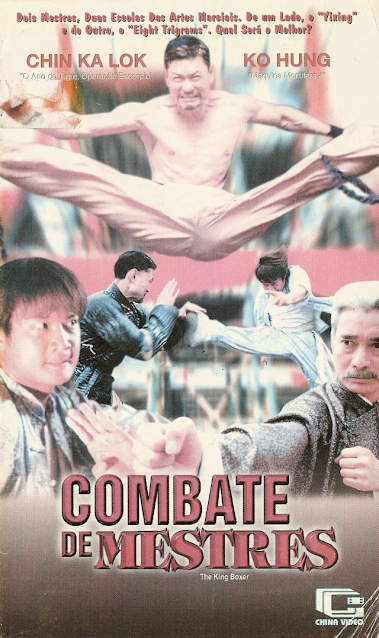Forced Vengeance (1982)
Starring: Chuck Norris, Mary Louise Weller, Camila
Griggs, Michael Cavanaugh, David Opatoshu, Seiji Sakaguchi, Frank Michael Liu,
Bob Minor, Lloyd Kino, Leigh Hamilton
Director: James Fargo
Action Director: Aaron Norris
I start
right off the bat saying that this is one of my least favorite Chuck Norris
films so far, at least from his Golden Age. Obviously, I’m going to guess that Forest Warrior and Bells of Innocence are worse than this, but for those made between Breaker! Breaker! and Delta Force 2, this one has definitely
been the weakest. It just felt like a total waste of action movie potential,
especially for one being set in Hong Kong during the 1980s! I realize that Winners and Sinners was still a year
away and Police Story wouldn’t be a
thing for another three, but Chuck had starred in Slaughter in San Francisco and had some idea of what Hong Kong
talent could be. This movie gives us NONE OF THAT.
Norris
plays Josh Randall, a former soldier turned “security chief” at a Hong Kong
casino. The casino is owned by half-Chinese, half-Jewish businessman Sam
Paschal (character actor David Opatoshu). Sam is now semi-retired, leaving his
son, David (Frank Michael Liu, who had roles in Johnnie To films like PTU and Breaking News), to run the joint. Obviously, my first question here
is “Does Hong Kong even have casinos?” My knee-jerk response is to say that
Hong Kong casinos aren’t even a thing—that’s what Macau is for. Usually in
these movies, if you need to throw in a casino, you have the characters take a
ferry to Macau. So, if you can ignore that factual inaccuracy, let’s go on with
the story.
As we’ll
learn later, the casino is in dire straits after David opened the casino for
betting on the then-current World Cup games, whose pay-outs were more than the
casino could afford. Enter the Osiris Group, run by Stan Raimondi (Michael
Cavanaugh, of The Haunting remake and
The Enforcer): Raimondi runs a rival
casino and wants to buy Paschal’s joint. Sam rejects Raimondi’s offer on the
grounds that Raimondi will turn it into a front for drugs and prostitution,
despite his son’s pleadings. Raimondi, in typical mobster fashion, responds by
having his goons murder the Paschal boys. Thus, the casino is left in the hands
of Sam’s daughter, Joy (Camila Griggs, who later played the gym teacher in the
“Buffy, the Vampire Slayer” series).
Randall,
who discovered the bodies, quickly finds Joy and leaves her in the care of his
girlfriend, Claire (Mary Louise Weller, who was in National Lampoon’s Animal House). The police arrest him as a
suspect in the Paschals’ murders, but one of the detectives is in Raimondi’s
pocket. Thankfully, the Asian one (Lloyd Kino, who had small roles in Mortal Kombat and the 1998 Godzilla) is the honest one and Randall
gets out. From there, he and the girls have to run all over Kowloon and
Victoria until he can discover who the true brains behind Osiris are.
Let me
start with the obvious: for being a film set in Hong Kong, there are a lot of
white people in this movie. I realize that it was a British colony, but yeah,
this is a very Caucasian rendition of Hong Kong. Oh sure, there are lots of
Chinese people as background players and extras, but even the so-called
“half-breed” characters are very white. Even two of the important Asian
roles—Inspector Chen and mob hitman Kam—are played by Japanese actors, the
latter being played by Japanese wrestler Seiji Sakaguchi. So yeah, this is the
least Chinese version of Hong Kong made since the golden days of Hollywood.
Apparently, a young Tony Leung Chiu-Wai has a brief scene as “young intern,”
although I couldn’t tell you what scene he appears in.
There
are many downsides to this inauthentic version of Hong Kong, including the fact
that Chuck and his brother Aaron failed to avail themselves of the local
stuntman talent for the fight scenes. This is one movie where Chuck should have
let Aaron just take a step back to observe and supervise, while letting an
actual Hong Kong choreographer actual handle the fights. There would have been
some real corkers, instead of giving a scene where a guy confronts Chuck with a
pair of nunchaku, only for the latter
to scare him away with a gun. The final showdown pits Chuck against Sakaguchi,
who is more of a big bruiser type than a talented martial artist. Some of these
fights have a violent edge to them, but are really lacking in the choreography
department. Michael Cavanaugh swings around a bo staff like he means it, but I’m sure that we would have
preferred Sammo Hung and the Hung Ga Ban instead.
The
movie also feels incompetently filmed, which is surprising considering that
director James Fargo helmed more competent fare, like the Dirty Harry entry The Enforcer. The editing is off: just
watch the scenes of the characters fleeing through Kowloon during the day,
followed by a fight scene (in slow motion) involving silhouettes of Chuck and
his opponent fighting in front of a neon sign (which makes it look like night),
and then cuts to the characters fleeing in the daytime. It’s a very odd scene.
There are other similar scenes that just don’t feel like they were edited or
photographed well.
For
exploitation fans, there is a brief scene at a strip joint with some dancers
showing their ta-ta’s. It ends with Chuck talking to the establishment’s star
prostitute…another white girl (Leigh Hamilton)!!! Actress Mary Louise Weller
also gives the viewer some rape nudity near the end in a scene that really did
not need to be in the movie. And like I said, some of the fights end on
bloodier notes than your typical Chuck Norris film of that era. But those
looking for quality bootage—or decent acting, directing, photography and
editing—will be better off looking elsewhere.















